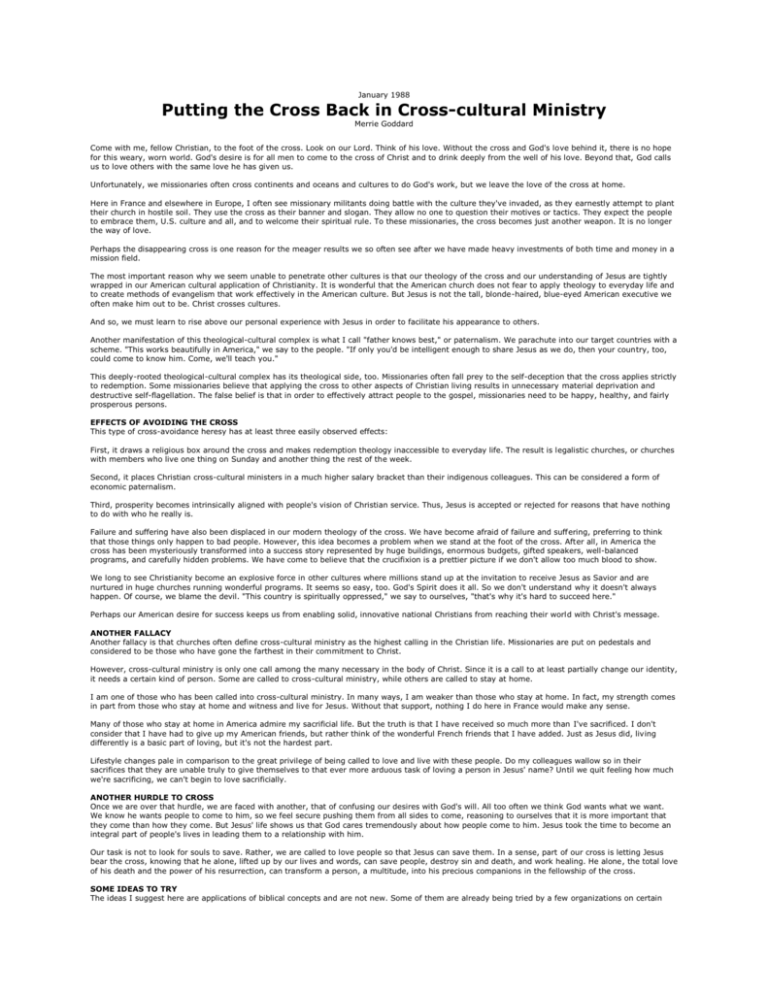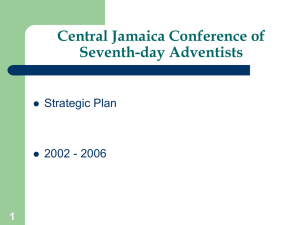
January 1988
Putting the Cross Back in Cross-cultural Ministry
Merrie Goddard
Come with me, fellow Christian, to the foot of the cross. Look on our Lord. Think of his love. Without the cross and God's love behind it, there is no hope
for this weary, worn world. God's desire is for all men to come to the cross of Christ and to drink deeply from the well of his love. Beyond that, God calls
us to love others with the same love he has given us.
Unfortunately, we missionaries often cross continents and oceans and cultures to do God's work, but we leave the love of the cross at home.
Here in France and elsewhere in Europe, I often see missionary militants doing battle with the culture they've invaded, as they earnestly attempt to plant
their church in hostile soil. They use the cross as their banner and slogan. They allow no one to question their motives or tactics. They expect the people
to embrace them, U.S. culture and all, and to welcome their spiritual rule. To these missionaries, the cross becomes just another weapon. It is no longer
the way of love.
Perhaps the disappearing cross is one reason for the meager results we so often see after we have made heavy investments of both time and money in a
mission field.
The most important reason why we seem unable to penetrate other cultures is that our theology of the cross and our understanding of Jesus are tightly
wrapped in our American cultural application of Christianity. It is wonderful that the American church does not fear to apply theology to everyday life and
to create methods of evangelism that work effectively in the American culture. But Jesus is not the tall, blonde-haired, blue-eyed American executive we
often make him out to be. Christ crosses cultures.
And so, we must learn to rise above our personal experience with Jesus in order to facilitate his appearance to others.
Another manifestation of this theological-cultural complex is what I call "father knows best," or paternalism. We parachute into our target countries with a
scheme. "This works beautifully in America," we say to the people. "If only you'd be intelligent enough to share Jesus as we do, then your country, too,
could come to know him. Come, we'll teach you."
This deeply-rooted theological-cultural complex has its theological side, too. Missionaries often fall prey to the self-deception that the cross applies strictly
to redemption. Some missionaries believe that applying the cross to other aspects of Christian living results in unnecessary material deprivation and
destructive self-flagellation. The false belief is that in order to effectively attract people to the gospel, missionaries need to be happy, healthy, and fairly
prosperous persons.
EFFECTS OF AVOIDING THE CROSS
This type of cross-avoidance heresy has at least three easily observed effects:
First, it draws a religious box around the cross and makes redemption theology inaccessible to everyday life. The result is legalistic churches, or churches
with members who live one thing on Sunday and another thing the rest of the week.
Second, it places Christian cross-cultural ministers in a much higher salary bracket than their indigenous colleagues. This can be considered a form of
economic paternalism.
Third, prosperity becomes intrinsically aligned with people's vision of Christian service. Thus, Jesus is accepted or rejected for reasons that have nothing
to do with who he really is.
Failure and suffering have also been displaced in our modern theology of the cross. We have become afraid of failure and suffering, preferring to think
that those things only happen to bad people. However, this idea becomes a problem when we stand at the foot of the cross. After all, in America the
cross has been mysteriously transformed into a success story represented by huge buildings, enormous budgets, gifted speakers, well-balanced
programs, and carefully hidden problems. We have come to believe that the crucifixion is a prettier picture if we don't allow too much blood to show.
We long to see Christianity become an explosive force in other cultures where millions stand up at the invitation to receive Jesus as Savior and are
nurtured in huge churches running wonderful programs. It seems so easy, too. God's Spirit does it all. So we don't understand why it doesn't always
happen. Of course, we blame the devil. "This country is spiritually oppressed," we say to ourselves, "that's why it's hard to succeed here."
Perhaps our American desire for success keeps us from enabling solid, innovative national Christians from reaching their world with Christ's message.
ANOTHER FALLACY
Another fallacy is that churches often define cross-cultural ministry as the highest calling in the Christian life. Missionaries are put on pedestals and
considered to be those who have gone the farthest in their commitment to Christ.
However, cross-cultural ministry is only one call among the many necessary in the body of Christ. Since it is a call to at least partially change our identity,
it needs a certain kind of person. Some are called to cross-cultural ministry, while others are called to stay at home.
I am one of those who has been called into cross-cultural ministry. In many ways, I am weaker than those who stay at home. In fact, my strength comes
in part from those who stay at home and witness and live for Jesus. Without that support, nothing I do here in France would make any sense.
Many of those who stay at home in America admire my sacrificial life. But the truth is that I have received so much more than I've sacrificed. I don't
consider that I have had to give up my American friends, but rather think of the wonderful French friends that I have added. Just as Jesus did, living
differently is a basic part of loving, but it's not the hardest part.
Lifestyle changes pale in comparison to the great privilege of being called to love and live with these people. Do my colleagues wallow so in their
sacrifices that they are unable truly to give themselves to that ever more arduous task of loving a person in Jesus' name? Until we quit feeling how much
we're sacrificing, we can't begin to love sacrificially.
ANOTHER HURDLE TO CROSS
Once we are over that hurdle, we are faced with another, that of confusing our desires with God's will. All too often we think God wants what we want.
We know he wants people to come to him, so we feel secure pushing them from all sides to come, reasoning to ourselves that it is more important that
they come than how they come. But Jesus' life shows us that God cares tremendously about how people come to him. Jesus took the time to become an
integral part of people's lives in leading them to a relationship with him.
Our task is not to look for souls to save. Rather, we are called to love people so that Jesus can save them. In a sense, part of our cross is letting Jesus
bear the cross, knowing that he alone, lifted up by our lives and words, can save people, destroy sin and death, and work healing. He alone, the total love
of his death and the power of his resurrection, can transform a person, a multitude, into his precious companions in the fellowship of the cross.
SOME IDEAS TO TRY
The ideas I suggest here are applications of biblical concepts and are not new. Some of them are already being tried by a few organizations on certain
fields of ministry. I believe that these principles need to be generally considered by the whole of the ministering church, if we seriously seek to bear the
cross in a dying world.
The first place for change must be within the individual. My plea is that each person examine himself or herself and earnestly seek the will of God.
In the mission tradition we look for people who have a call from God to save the lost in another culture than our own. I suggest to you, who seek the will
of God for your life, that you first seek four things by which you may judge whether or not God is calling you to this ministry.
First, look unto Jesus. Pore over the gospels and find out how Jesus loved and lived. Seek him in your daily life and relationships. Build your life on prayer
and submit yourself to a loving community of believers and seek Christ with them.
Second, learn to love. Apprentice yourself, not only to Jesus, but to those who live his love in the byways of life. The question you must ask yourself is
not, "Do I want to win souls for Christ?" but, "Am I willing to learn to love people, to live with people so that Jesus can become real to them?"
Third, find out if you love those particular people to whom you may be called. This process may take years and may include language study, travel,
cultural exchange, and short-term mission service. You must love and learn to live with those people to whom Jesus is calling you. This does not mean
that you will love everything, every minute, every person in the culture. But it does mean that you can live in that culture, making your life there without
longing every day for your former home.
Fourth, do your seeking within the context of Christ's body, the church. Christ does not call loners. His Spirit works over his body and differentiates the
individual functions necessary for movement, vision, and growth. When you receive a true call to cross-cultural ministry, other believers will recognize it,
too, and they will help you as you seek to do God's will.
A PLEA TO CHURCHES
My second plea for change is to the churches. The local churches, the firmly established beacons of Christ's kingdom, are responsible for Christ's ministry
on earth. That ministry includes nurturing those who will be sent out and supported in cross-cultural ministry.
The call to cross-cultural ministry should not be glorified by the church, nor should the church pretend that it no longer exists. Rather, the church should
teach that the call to cross-cultural ministry is only one of the many necessary gifts the Holy Spirit cultivates in God's people.
A PLEA TO MISSIONS AND SCHOOLS
My final plea for change is directed to mission agencies and training schools. They must realize that they function only as a specialized tool in the hands
of the Almighty, to enable his church to send out equipped cross-bearers to other cultures. They are servants who educate those whom the churches
send them. The churches are their co-workers. Without the churches, those who are sent will have no roots and no nurture.
The schools and agencies must learn to slow down. After all, God was, and is, willing to take his time. So why must we be in such a hurry? Should God
have skipped Abraham, Moses, David, and the prophets so that Jesus might have come upon the scene immediately after the fall? It would certainly be
more cost-effective if every person made a decision for Christ after hearing the gospel for the first time. But God doesn't work that way, and neither
should we.
Too often, Bible schools, seminaries, and mission agencies have become ways and means committees to a successful church or cross-cultural ministry.
Our ways are not ever complete. The Holy Spirit searches the heights of God and the depth of man's heart. We build best as we rely on him, collaborate
with the local church, and patiently work with those well-intentioned lumps of clay we call candidates.
A Christian witness is hand-crafted, not mass-produced, and emerges by contact with the hundreds of people whom God uses in his or her life. The
witness becomes polished in the secret of his or her daily relationship with the Almighty.
PARTNERSHIP NEEDED
Churches and mission agencies must work as partners with the churches in the cultures to which they send ministers. For many, this will necessitate a
change in their fundamental concept of mission. Many will also have to reform their entire mission strategy. These churches and mission agencies will no
longer work at controlling what their people do, because these cross-cultural ministers will become a part of the local church they are serving. Their
agenda will sometimes be determined jointly, and at other times it will be entirely controlled by the local church.
The former Chinese missionaries can testify to the urgency of our cooperation with the local churches. For when this hostile age casts us out, the Holy
Spirit will simply work through our indigenous colleagues.
Of course, the above means that we need to be training new kinds of cross-cultural ministers, team members, people who know how to initiate while
submitting to other people's ideas and authority, people who know how to take their time. We need to nurture those who need to learn, and those who
are willing to earn their right to be heard.
These servants of God will have the mind of Christ. These followers of Christ will cross to another culture with a message: "Jesus loves you. And I am
willing to have my presuppositions, methods, and even my profound understanding of life shaken and remade by you, that we together might serve the
risen Christ." These ambassadors will resolutely bear the cross of Christ across many cultures, ready to live and die that Jesus Christ might be glorified.
----Copyright © 1988 Evangelism and Missions Information Service (EMIS). All rights reserved. Not to be reproduced or copied in any form without written
permission from EMIS.









